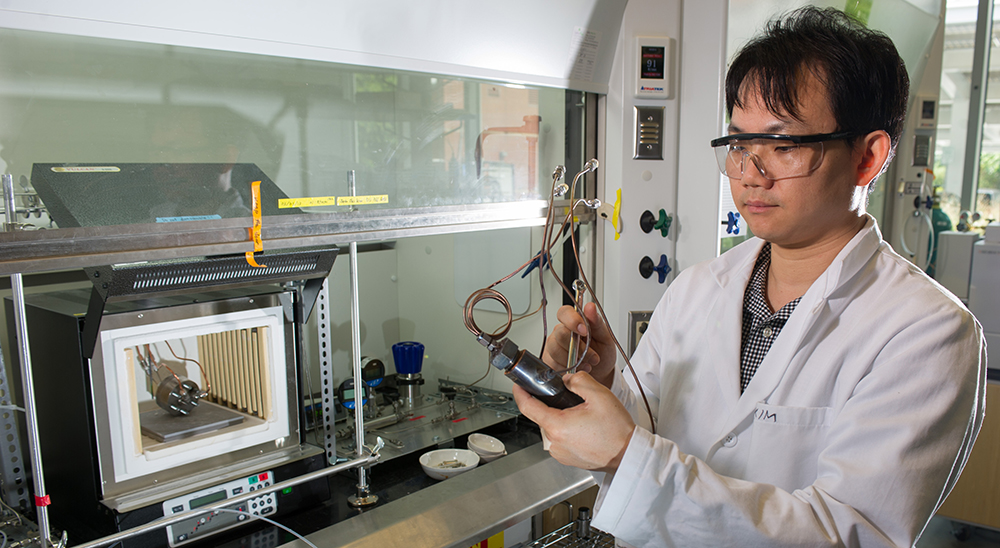Researchers at Georgia Tech are creating energy technologies and systems that will provide secure, affordable, and reliable energy now, and into the future. Our commitment to creating better ways to utilize current fuel sources while maximizing efficiency and minimizing the environmental impacts is unparalleled. At Georgia Tech, energy innovation is everywhere, spanning all six colleges and fostering a multidisciplinary approach to solving the most pressing energy problems.
Energy Generation, Storage, and Distribution
 Electricity generation and distribution in the US has evolved as a centralized system. Customers receive electricity from very large power plants that are 10's or 100's of miles away over a vast network of transmission lines and transforming stations. This landscape is changing due to the rapid adoption of renewables, smart grids, micro grids, small-scale producers, energy storage, net metering, and consumer level grid-tied systems. Georgia Tech researchers are developing the technologies to enable all of these emerging systems to work together for a more resilient, efficient, and cleaner energy future.
Electricity generation and distribution in the US has evolved as a centralized system. Customers receive electricity from very large power plants that are 10's or 100's of miles away over a vast network of transmission lines and transforming stations. This landscape is changing due to the rapid adoption of renewables, smart grids, micro grids, small-scale producers, energy storage, net metering, and consumer level grid-tied systems. Georgia Tech researchers are developing the technologies to enable all of these emerging systems to work together for a more resilient, efficient, and cleaner energy future.
Related Efforts
- Ben T. Zinn Combustion Laboratory
- Carbon Neutral Energy Solutions Laboratory
- Center for Distributed Energy (CDE)
- Center for Innovative Fuel Cell and Battery Technologies (FCBT)
- Georgia Tech Advanced Battery Center (GTABC)
- National Electric Energy Testing Research and Applications Center (NEETRAC)
- Supply Chain and Logistics Institute (SCL)
Renewable Energy
 Moving toward a net-zero carbon future will require all the renewable energy options we have. Great progress has been achieved in the past few decades, but much more is needed. Georgia Tech researchers have been, and continue to be, at the forefront of developing and improving renewable energy technologies.
Moving toward a net-zero carbon future will require all the renewable energy options we have. Great progress has been achieved in the past few decades, but much more is needed. Georgia Tech researchers have been, and continue to be, at the forefront of developing and improving renewable energy technologies.
Energy Utilization and Conservation
 Developing new and cleaner sources of energy is just half of the challenge. Putting our energy resources to the most efficient and appropriate use is equally as important. Conserving energy is often one of the best and most cost-effective ways to reduce carbon emissions. Given the huge array of energy consuming systems and devices we use on a daily basis, the opportunities for researching improvements in energy utilization and conservation are equally huge.
Developing new and cleaner sources of energy is just half of the challenge. Putting our energy resources to the most efficient and appropriate use is equally as important. Conserving energy is often one of the best and most cost-effective ways to reduce carbon emissions. Given the huge array of energy consuming systems and devices we use on a daily basis, the opportunities for researching improvements in energy utilization and conservation are equally huge.
Related Efforts
- Ben T. Zinn Combustion Laboratory
- Brook Byers Institute for Sustainable Systems (BBISS)
- Carbon Neutral Energy Solutions Laboratory
- Center for Distributed Energy (CDE)
- Center for Transportation Operations and Safety (CTOS)
- Institute for Materials (IMat)
- Supply Chain and Logistics Institute (SCL)
- Sustainable Thermal Systems Laboratory (STSL)
Fuels and Chemical Processing
 The fuel and chemical sectors will continue to play important roles in the energy and industrial future of our lives for some time to come. Talk of liquid fuels mostly gives rise to thoughts of cars and gas stations. However, the infrastructure that has evolved to enable our liquid fuel powered transportation system is enormous and complex. An equally large infrastructure system runs in parallel to supply the world with chemicals that our industries rely upon. Georgia Tech researchers are working to ensure that these valuable resources are put to the best uses, in the most efficient ways, with the least amount of pollution possible.
The fuel and chemical sectors will continue to play important roles in the energy and industrial future of our lives for some time to come. Talk of liquid fuels mostly gives rise to thoughts of cars and gas stations. However, the infrastructure that has evolved to enable our liquid fuel powered transportation system is enormous and complex. An equally large infrastructure system runs in parallel to supply the world with chemicals that our industries rely upon. Georgia Tech researchers are working to ensure that these valuable resources are put to the best uses, in the most efficient ways, with the least amount of pollution possible.
Energy Policy and Economics
 Researchers at Georgia Tech are developing sound and data driven strategies to address the critical and complex policy implications of the energy landscape we inhabit. Profound economic, security, equity, and environmental considerations associated with energy generation, storage, distribution, and use require just as much consideration as the systems themselves. Fostering a collaborative approach to problem solving, Georgia Tech researchers are helping to ensure safer, more reliable, more equitable, and affordable supplies of energy to meet our needs now, and in the future.
Researchers at Georgia Tech are developing sound and data driven strategies to address the critical and complex policy implications of the energy landscape we inhabit. Profound economic, security, equity, and environmental considerations associated with energy generation, storage, distribution, and use require just as much consideration as the systems themselves. Fostering a collaborative approach to problem solving, Georgia Tech researchers are helping to ensure safer, more reliable, more equitable, and affordable supplies of energy to meet our needs now, and in the future.




